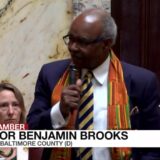As Florida’s Proposition 3, which seeks to legalize recreational cannabis for adults, looms on the horizon, Governor Ron DeSantis and the Florida hemp industry are forming an unexpected but powerful alliance in an effort to defeat it. Though this partnership might seem to come from a place of political and economic necessity, the motivations driving these efforts reveal a much more intricate and somewhat hypocritical landscape.
DeSantis’s Calculated Opposition
Governor DeSantis, who has consistently aligned himself with conservative principles, has positioned himself firmly against the legalization of recreational marijuana. Back in June, he vetoed a bill that could have imposed significant restrictions on the hemp industry, which has flourished in the state in recent years. DeSantis framed this veto as a means of protecting small businesses from unnecessary regulatory burdens. However, there’s more to the story.
DeSantis has made it clear that he’s no fan of recreational cannabis. During a June press conference, he remarked that passing Prop 3 would result in “the entire state smelling like marijuana” and that the initiative “needs to go down hard.” This is where the alliance between DeSantis and the hemp industry becomes strategic. By blocking this bill, DeSantis has indirectly aligned himself with the Florida Healthy Alternatives Association, one of the state’s largest hemp groups and vehement opponents of Prop 3.
While DeSantis has maintained that his veto was primarily to protect small businesses, it’s hard to overlook the political calculations. With both the Republican Party of Florida and the hemp industry fighting against Prop 3, the governor has found a convenient alignment that bolsters his conservative credentials while also benefiting from contributions to his political committee.
The Hemp Industry’s Crusade
On the surface, it might seem like the Florida hemp industry is fighting for survival against the big bad marijuana conglomerates, particularly Trulieve, the state’s largest marijuana company and one of the key backers of Prop 3. Florida Healthy Alternatives Association President J.D. McCormick has painted a David-versus-Goliath picture, claiming the passage of recreational marijuana would “squeeze” small hemp businesses out of the market.
But dig a little deeper, and the narrative becomes much more self-serving. The Florida hemp industry isn’t so much concerned about the public’s well-being or the state’s economic future; instead, it’s worried about its bottom line. After all, this is the same industry that has been profiting heavily from selling unregulated intoxicating products like delta-8 and THCa, substances that are derived from hemp but can still produce psychoactive effects similar to marijuana. These products are often sold without the same rigorous oversight or quality control that medical marijuana undergoes, making the hemp industry’s cries of being “squeezed out” seem more like a desperate attempt to protect their lucrative corner of the market.
Trulieve vs. The “Small Business” Rhetoric
The hemp industry’s portrayal of itself as a collection of innocent small businesses being unfairly targeted by Trulieve is also a bit of a stretch. While Trulieve is indeed a dominant force in Florida’s cannabis market, the hemp industry’s framing of itself as purely mom-and-pop operations is misleading. Many hemp companies in Florida are substantial operations, profiting handsomely from the sale of unregulated intoxicants. So, when McCormick and others cry foul about being pushed out by Trulieve, what they’re really lamenting is the potential loss of market share in a rapidly evolving industry.
What’s more, McCormick’s claims that Trulieve supported the hemp bill that DeSantis vetoed are somewhat dubious. While records show that Trulieve may have monitored the bill, there’s no evidence they took an official position or lobbied for its passage. Trulieve’s focus, according to their spokesperson, is on “bringing safe, legal marijuana to adults in Florida” and eliminating “dangerous, unregulated products from the market.” In other words, the exact kind of products that the hemp industry is fighting to keep on store shelves.
Hypocrisy at Play
It’s hard to ignore the hypocrisy coming from the hemp industry in this battle. For years, they’ve benefited from the murky legal status of products like delta-8 THC, which can deliver a similar high to marijuana without the same regulatory scrutiny. This lack of oversight has allowed them to profit off a loophole, selling intoxicating products without the same restrictions or taxes that apply to medical marijuana.
Yet, now that Prop 3 threatens to regulate and legalize a competitor—recreational cannabis—the hemp industry suddenly wants to position itself as the protector of Floridians, claiming that legalization will harm small businesses and flood the market with dangerous products. But how different is their own business model?
Lobbying and Political Maneuvering
The intersection of political lobbying and economic self-interest is in full display ahead of the Prop 3 vote. Florida Healthy Alternatives has been working hand in hand with the Republican Party of Florida to drum up opposition to the amendment. The party’s chairperson, Evan Power, is also a lobbyist for Florida Healthy Alternatives, blurring the lines between political influence and corporate interests.
The hemp industry has pledged to raise millions to fight Prop 3, with the goal of swaying public opinion and securing enough “no” votes to stop recreational cannabis in its tracks. But this isn’t a grassroots movement of concerned citizens—it’s a coordinated effort by a well-funded industry to preserve its profits. Hemp executives, farmers, and distributors have been flooding DeSantis’s office with letters and emails urging him to veto bills that could curtail their business, and they’ve been pouring money into the governor’s political committee to ensure their interests are protected.
Meanwhile, the Republican Party is mobilizing its base, distributing materials to county organizations across the state in an effort to defeat Prop 3. The combination of political pressure, strategic lobbying, and fear-mongering about the impact of cannabis legalization has created a potent opposition front.
Public Safety or Power Play?
What motivations lie behind Governor DeSantis’s opposition and the hemp industry’s pushback? They often claim it’s about protecting small businesses or ensuring public safety—but could there be a deeper economic and political agenda at play? With the hemp industry working to defend its market share and DeSantis potentially using the debate to strengthen his conservative image and attract industry support, this may be more a matter of market power and influence than public welfare.




















